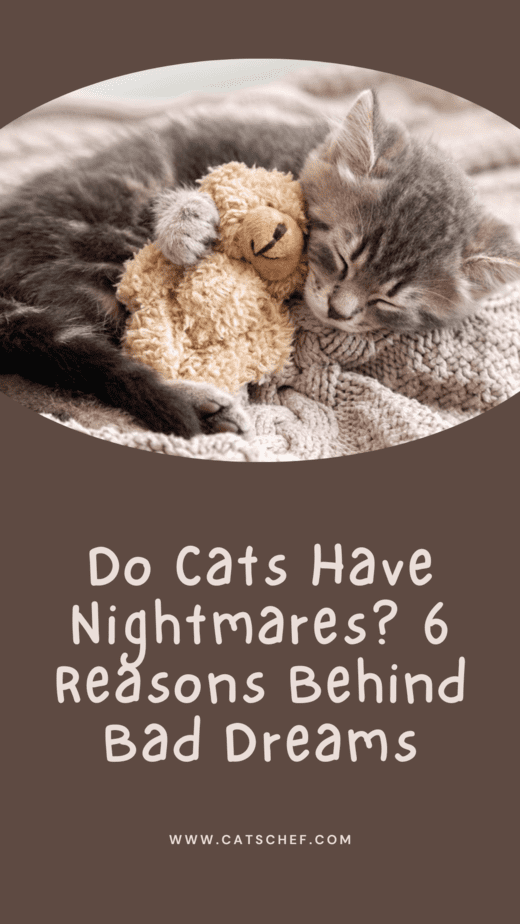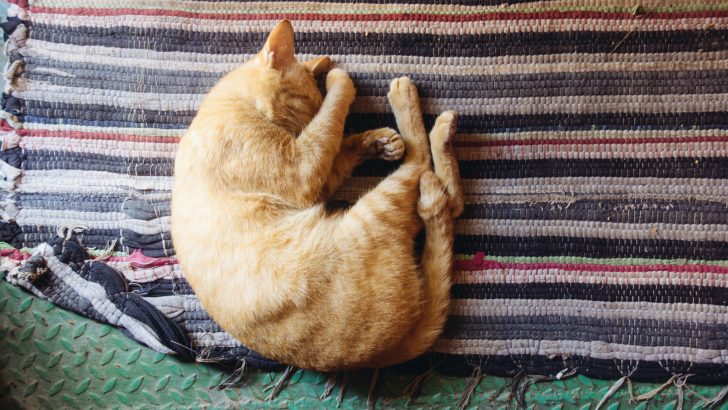I think we can all agree that there’s hardly anything better than napping with your kitty. Just the two of you, curled up together under the blanket while dreaming only the most beautiful dreams. But what if your fluffball has bad dreams? You can’t help but wonder, do cats have nightmares sometimes?
When I was a little girl, I grew up surrounded by many cats. For as long as I can remember, we have always been a cat-friendly family, saving as many strays as we possibly could. That’s where my love and affection for cats come from.
Anyway, I remember I used to watch our cats sleep. It had been sort of a hobby of mine; I would be drawing or coloring something, or playing with my dolls while simultaneously watching how blissfully our cats were zoned out.
It was always fascinating to me when their paws would start to move or their whole body to twitch. Or when they would release a silent chirp, all while sleeping and dreaming. It’s silly, but back then I imagined how one day I would be the first lady who invented the machine for reading cats’ dreams.
That never happened, of course. But my fascination with cats and their dreams remained to this day.
As a kid, I thought cats only dreamt about pleasant stuff, like hunting rodents or munching on treats. But I learned that cats can have bad dreams, too.
So, I’ve done a lot of research on sleeping and dreaming of cats and I think I’m armed with good knowledge. If you’re also interested in things like this then this is the article for you.
Cats and sleeping: How do cats sleep?
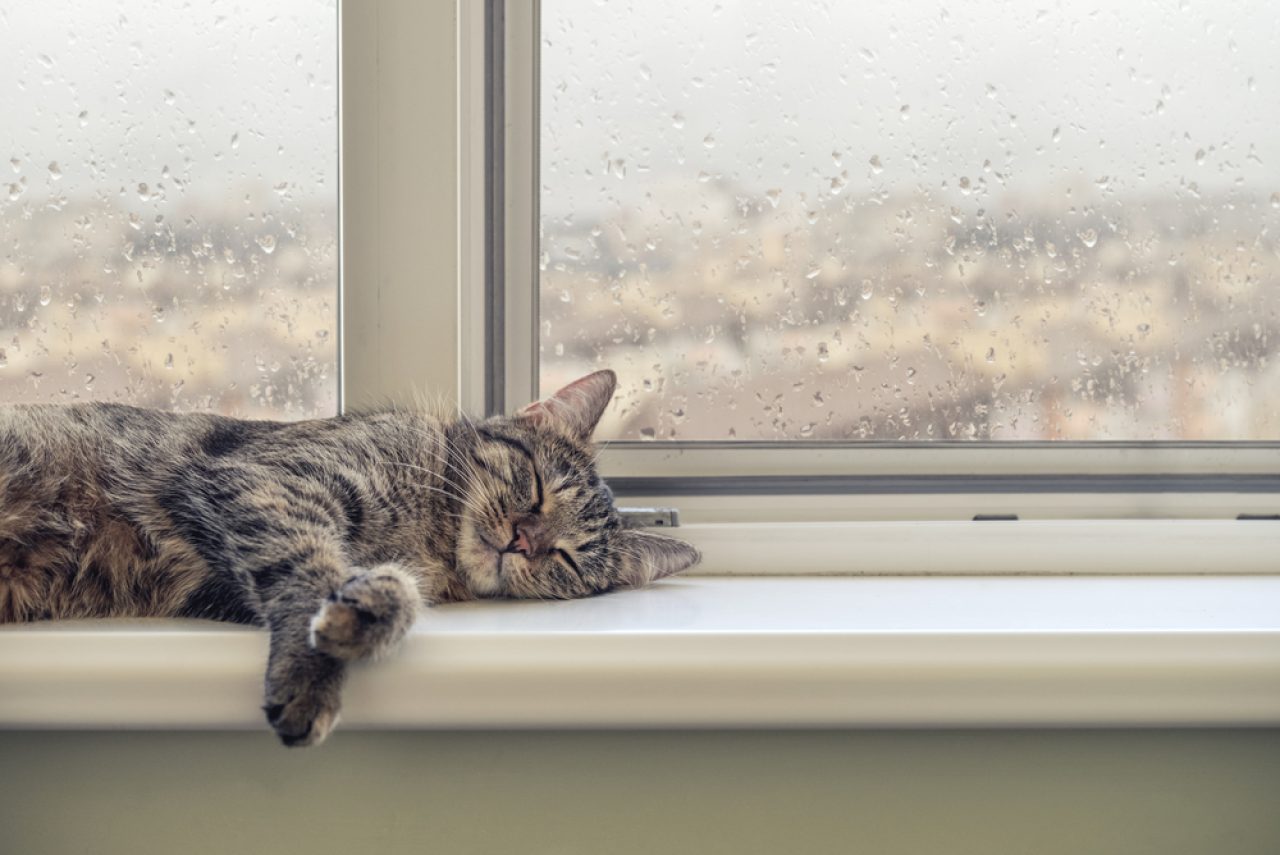
You’ve probably noticed that your little furbaby sleeps a lot. And I mean a lot. It appears as though she sleeps all day, right?
So, before we venture into the adventure of figuring out if cats have nightmares, we have to see what their sleeping pattern is like.
Most cats sleep between 12 and 18 hours a day. If that seems like too much, wait until you hear this: the number of hours of sleep increases as cats age. Hardly believable, but true. Some older cats may spend up to 20 hours asleep per day. And here I am, struggling to get a decent 8-hour sleep at night.
However, unlike us, cats have polyphasic sleep patterns which means that, rather than having one extended sleeping session, they sleep multiple times each day. We can say that our furry friends gave the name to our favorite after-lunch activity – the catnap.
Since they are crepuscular creatures and most active at dusk and dawn, they usually do the majority of the sleeping during the day. When they sleep, their body is resting and their energy’s being restored, so they can be ready to answer their nature’s call and hunt during the night (or, at least attempt to).
What about their sleeping cycle?
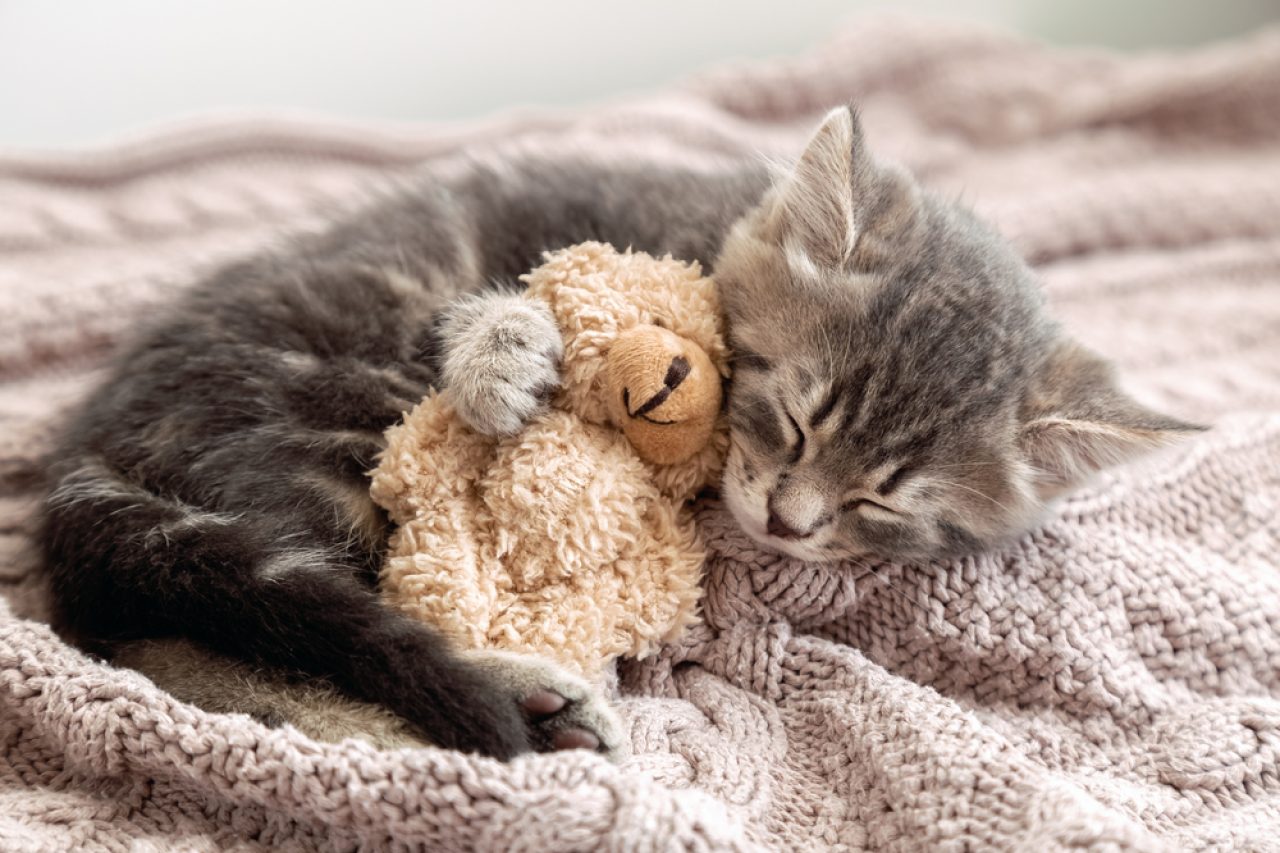
It’s said that cats go through two stages of sleep. The first one is called Slow-wave sleep (SWS) and it’s the shallowest form of rest. During this stage, their senses are still stimulated by the environment, and they are ready to wake at any moment if necessary.
As they’re in the slow-wave stage of sleep, they might keep one or both eyes open, so they could react to or run away from any potential threat.
The second stage is called Rapid-eye movement (REM). This is a deeper form of sleep where cats are likely to dream. And according to researchers, only 25 percent of their sleep is actually this deep kind of sleep.
During this stage, their muscles are completely relaxed, but their paws and ears can twitch. Sometimes, it appears as though they are running in their sleep; they seem active because their brain functions the same way as when they’re awake.
Do cats dream?
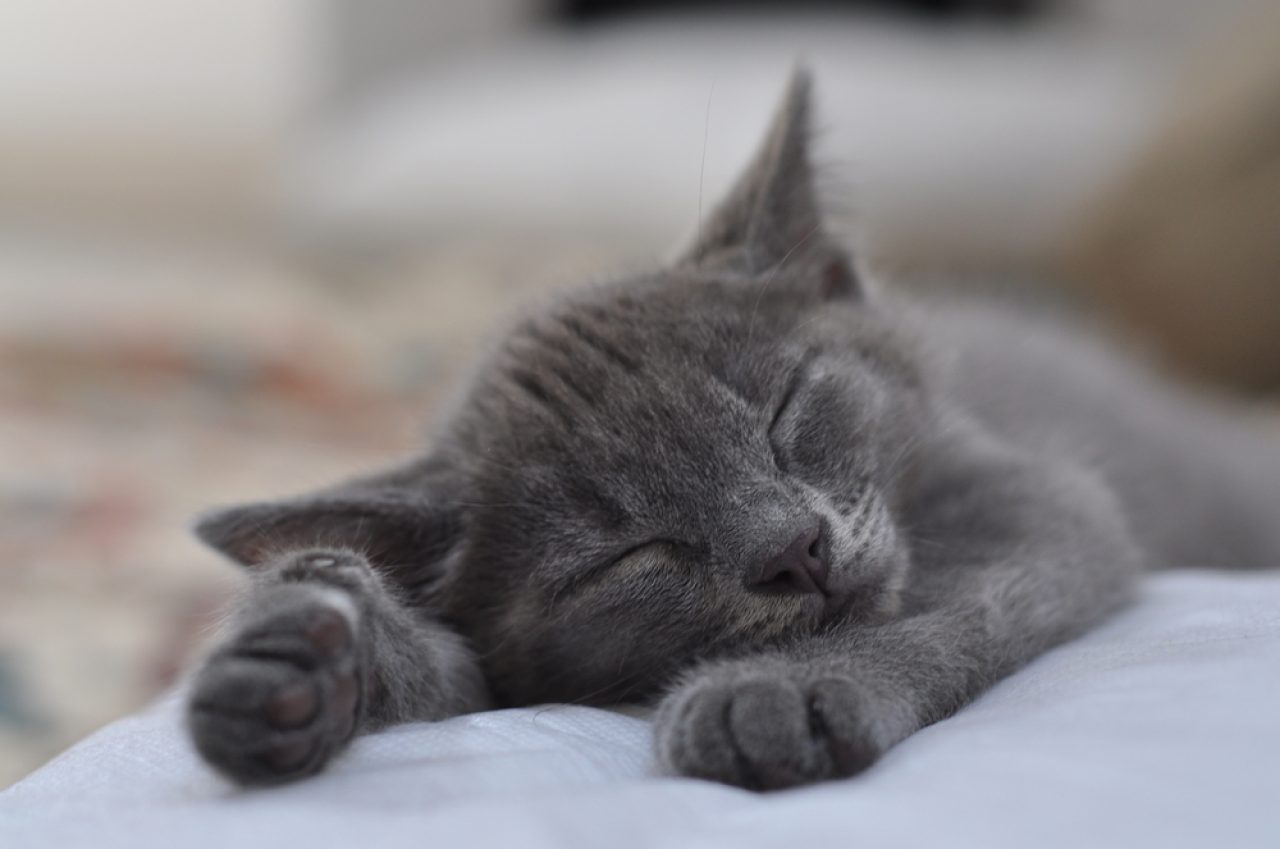
Before we answer the question “Do cats have nightmares?”, we have to determine whether they even dream or not. And if yes, what actually do they dream about?
As we were able to see, cats have a similar sleeping pattern to ours. Their whole body relaxes during the REM stage, their paws, and ears twitch, and their eyes rapidly move (hence, the name). This may be a weak indicator of dreaming, but it does suggest something is going on in their little heads.
Therefore, yes – it’s highly likely that cats dream. But, what do they dream about?
Some researches show that cats exhibit a hunting-like behavior when sleeping. They arch their backs, move their heads as though they’re watching something, and even occasionally hiss and meow. This is to be expected; hunting is a part of their nature, so it’s no surprise they dream about their favorite activity.
Other researchers propose that cats may also dream about things that happened that day or in the distant past. They may be re-experiencing cuddling with their human which took place several hours before they dozed off, or they may be re-living the bird hunt that happened last week.
Either way, it’s true – our feline companions do dream! Wouldn’t it be amazing if they could tell us what they dreamt about?
Do cats have nightmares?
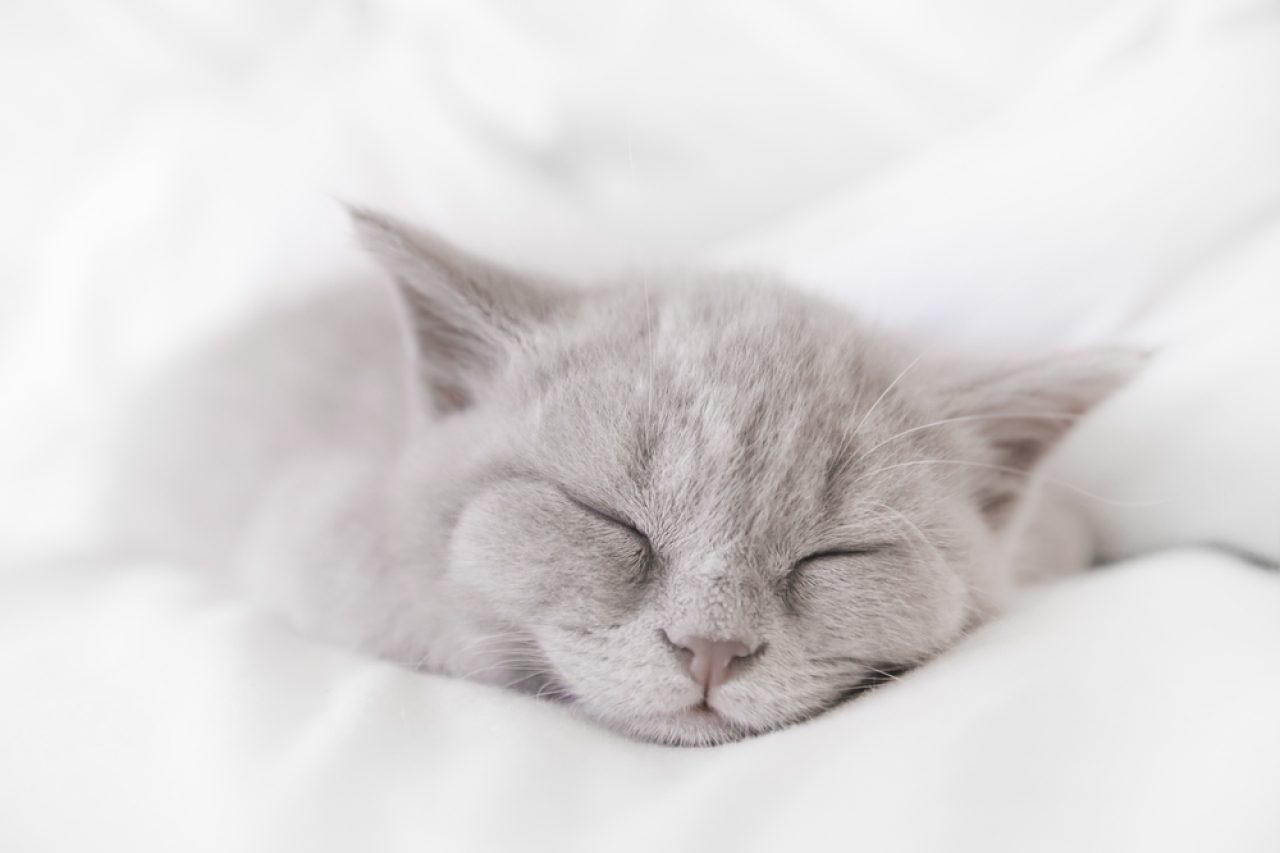
Every cat parent wants his furbaby to have the best cat life ever. This includes wishing their dreamland experience is filled with the best and most enjoyable things, like great hills of treats, mystical forests of catnip, and easy-to-catch birds and mice.
But, what if those sweet dreams are not always sweet? What if our fluffballs have bad dreams as well? We cannot help but ask, do cats have nightmares?
The very fact that cats are likely to dream opens the door to potential bad dreams. So yes, unfortunately, cats do have nightmares, too.
Generally, it’s hard to determine whether their dreams were good ones or bad ones (since, you know, they can’t tell us). However, their behavior says a lot, and you don’t have to be fluent in Cat to know to differentiate between pleasant and not-that-pleasant dreams.
It’s said that cats who wake up frightened and alerted, with their eyes wide opened and ears flatted, had probably just had a nightmare. Also, if they display weird behavior while sleeping, like rapid breathing, fidgeting, and twitching, they’re probably in the middle of a bad dream.
Why do cats have nightmares? 6 possible reasons
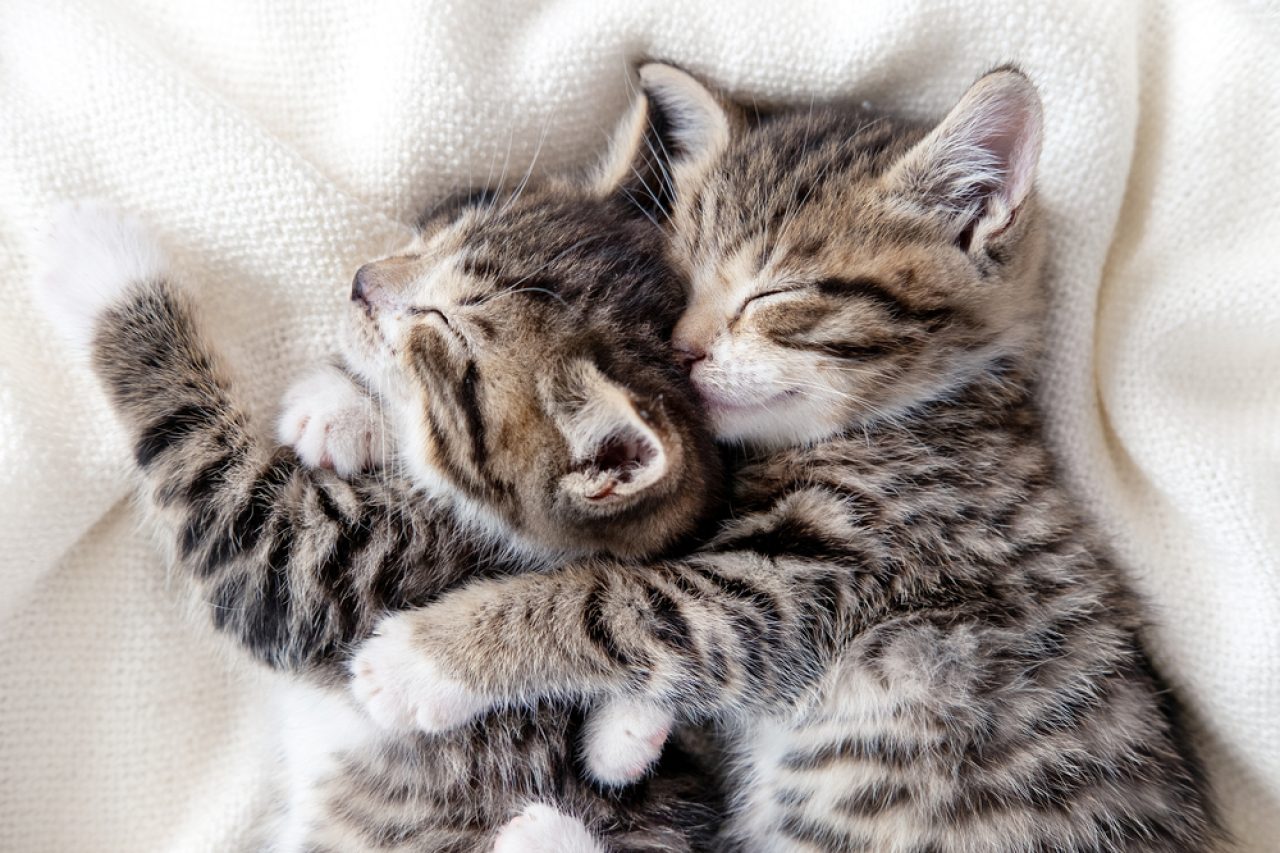
Ok, so far we learned about cats’ sleeping schedules. We learned that they can dream and even speculated about what they might be dreaming about. We also said that those dreams can be bad ones, and now the question that arises is, why do cats have nightmares?
We know why we have nightmares. Usually, they occur because of a scary horror movie we watched or because of something stressful that had happened to us or in the world in general. Sometimes it can all get mixed up in a bunch of illogical but terrifying sequences of events that never happened and potentially never will.
Cats are not like us. Even though they love to lie on the couch and watch TV with us, they don’t really get affected by the content as much as we do.
We can watch the news, for example, and be so devastated because of the situation in our country that we end up having bad dreams, while our cats won’t be as nearly affected by inflation or taxes as we would.
Their nightmares consist of previously experienced traumas and real-life events which had hurt them in some way. They will not dream of a house full of venomous snakes (which is a dream I had last night) but will dream of a dog that chased them down the street several weeks ago.
Below, I’ve listed 6 possible reasons behind feline nightmares so you get a better understanding of why cats experience these scary dreams.
1. It is because of their age
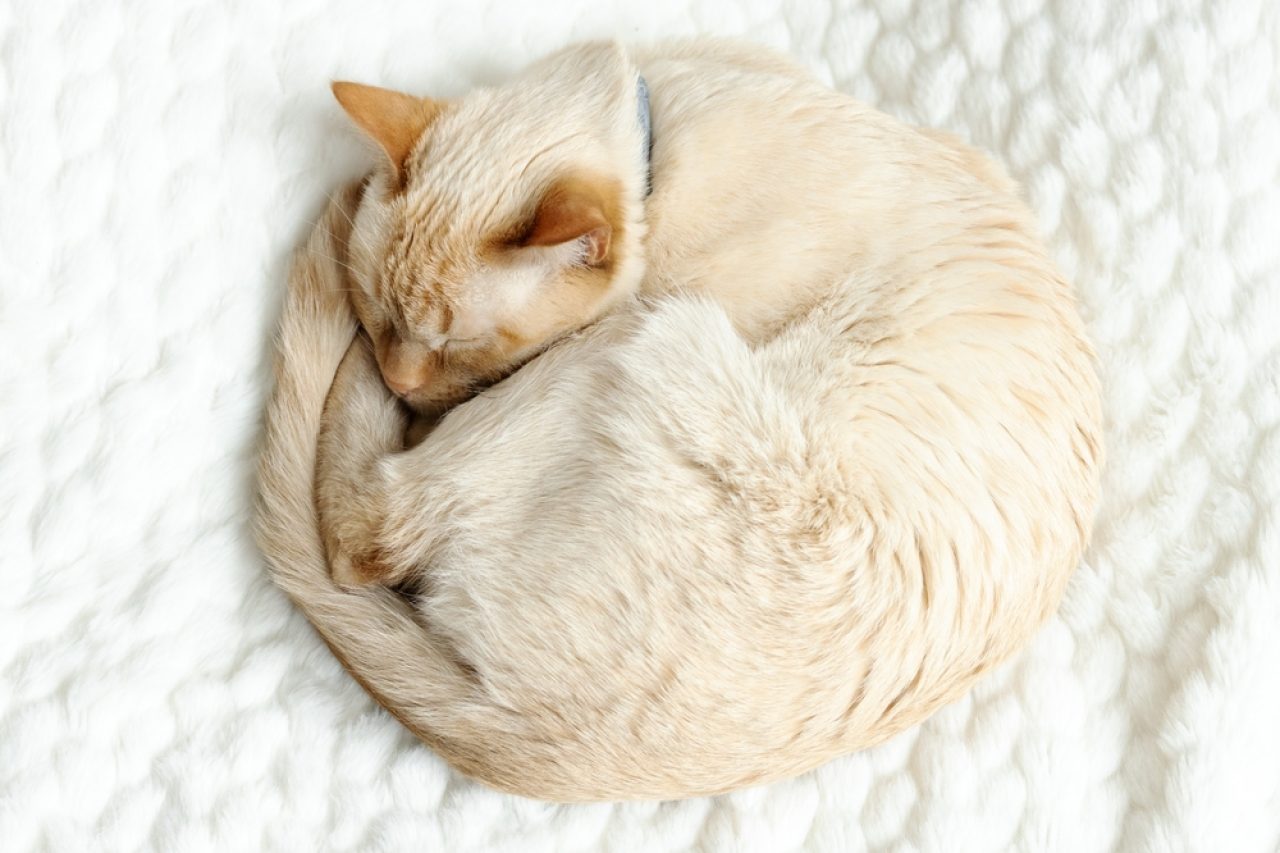
Cats’ age is one of the reasons behind feline nightmares, but it sure is a complicated one.
It’s said that the REM stage is more frequent in kittens, and therefore it can be concluded that kittens have more nightmares.
However, as we have said before, cats’ nightmares usually come from traumatic situations experienced sometime during their life. Since kittens are so young and don’t have that much experience, some might wonder, “How on earth can kittens even have nightmares?”.
Well, it’s important to remember that it doesn’t matter how many bad experiences they had; it’s not about the quantity, but the quality, or in this case the negativity of the past event.
Kittens’ nightmares may be a result of the early separation from their mother, for example. In our eyes, it’s an insignificant event (some people don’t even blink when they give kittens to their friends, separating them from their mother and each other), but for kittens, it’s terrifying.
So, if you happen to have a kitten, and you saw how restlessly she sleeps, don’t throw away the possibility of nightmares. Even though she’s young, she can still have bad dreams.
2. They are re-experiencing the sense of abandonment
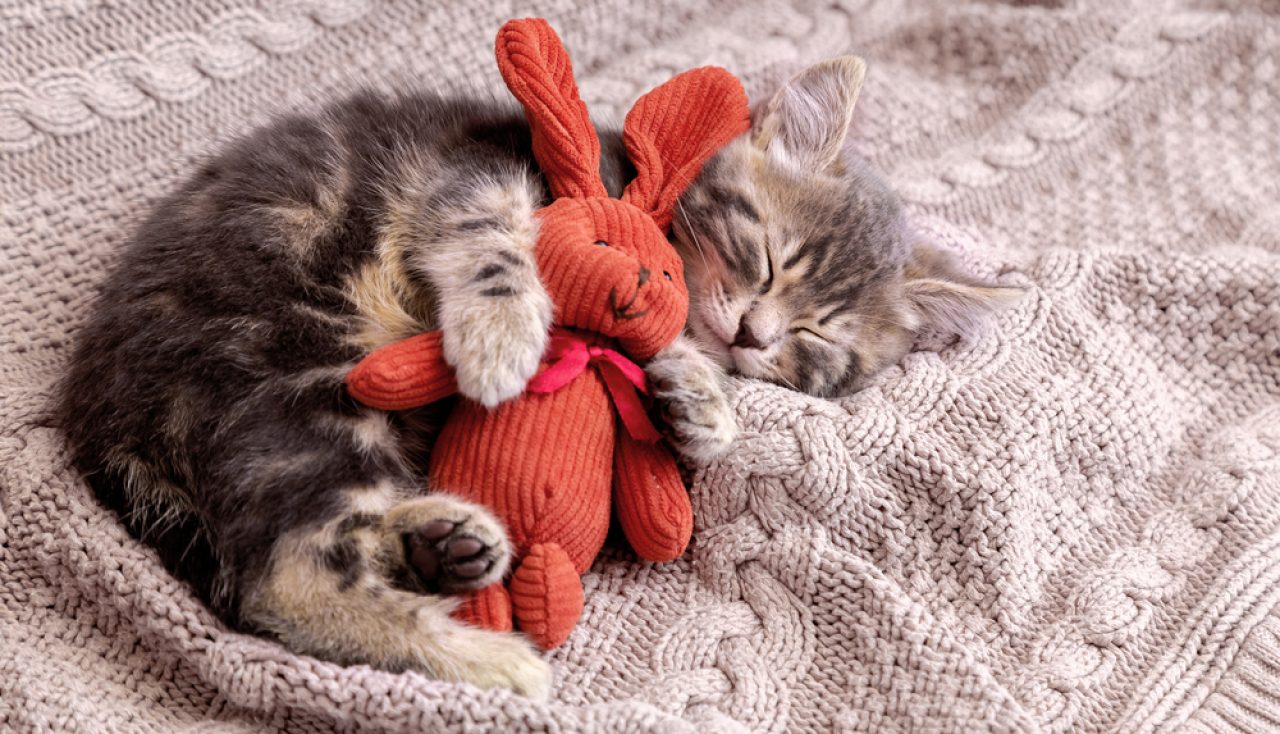
Why do cats have nightmares, you ask? Well, because they have a fear of being abandoned.
Cats may have the infamous reputation of being the unfriendliest of them all, but that’s actually far from the real truth. Although they appear cool and disinterested, cats crave our affection and our presence in their lives. They do miss us when we’re gone!
Their dreams may never consist of an imaginative abandonment scenario, but cats can have nightmares about a situation in their past when they have been left alone for too long. Even if their current owner spends plenty of time with them, if they had a bad experience in the past, they’ll surely dream about it.
Most cats are prone to separation anxiety, and it’s no wonder that one of their worst dreams happens to be being separated from their owners.
3. They are dealing with some physical pain
Cats are masters of hiding their pain, especially older cats. So, for the most part, it’s hard to determine that something is wrong with them during their waking hours.
However, it’s hard for them to control their poker face when they’re sleeping. If they are in any kind of pain, they might be dreaming about it, and have nightmares. They can also re-live previous injuries and painful situations that left a huge impact on their little furry lives.
Therefore, any kind of experienced pain is an important trigger of bad dreams and one of the reasons why cats have nightmares.
4. They have been bullied or involved in a conflict with other pets
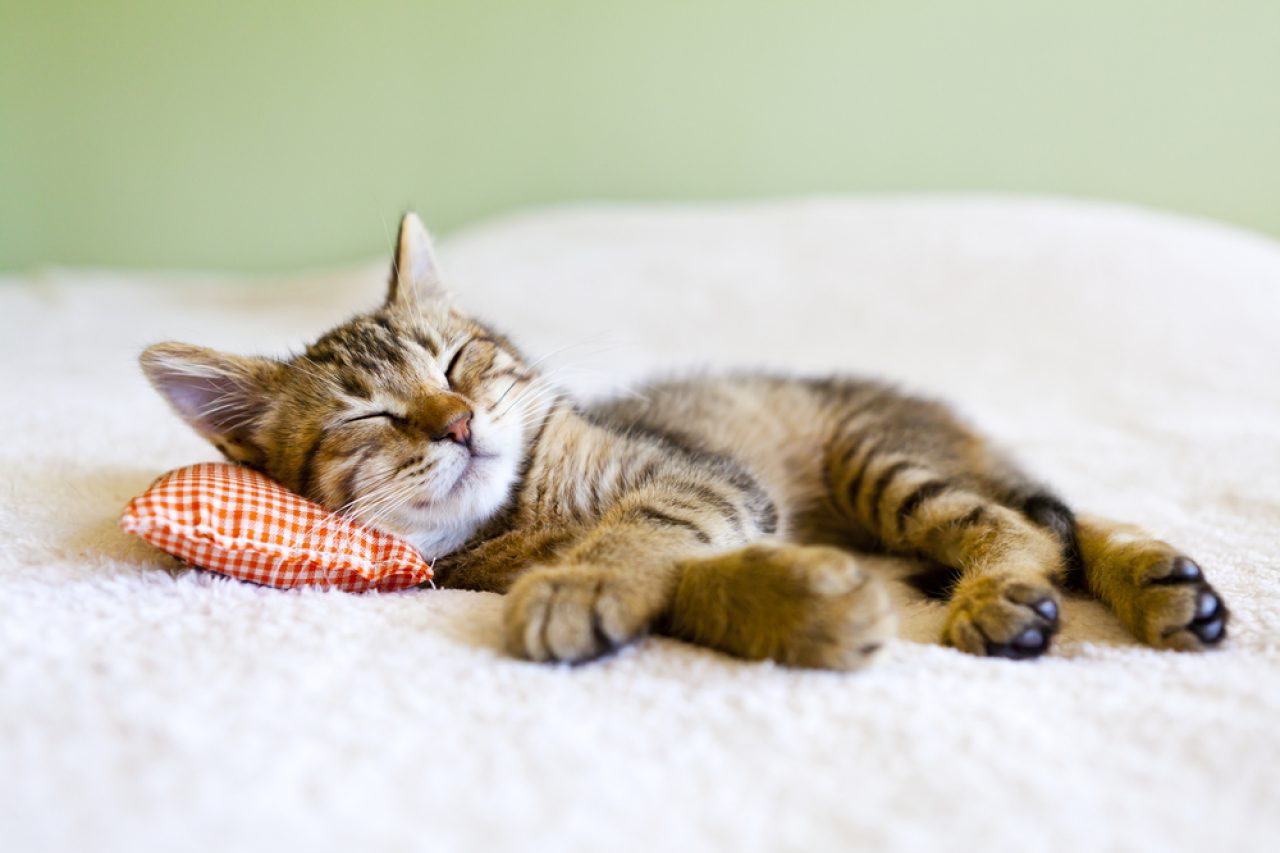
Another possible reason why cats have bad dreams hides in their relationship with other animals.
In multi-cat households, there’s usually always that one cat that is more dominant than the others. That cat can potentially bully other cats, causing some of them to have bad dreams.
This can also happen in households that have other animals which are naturally bigger and stronger than cats, like dogs for example. Cats who are dealing with nightmares while asleep could be dealing with a violent dog while awake.
The dog might be unaware that he’s scary, though. He might be just playful, but sometimes cats don’t see it that way.
These more dominant animals which represent a threat don’t have to be from the same household as the scared kitty. They could be a neighbor’s not-that-friendly pet.
5. They are re-living some frightening experience
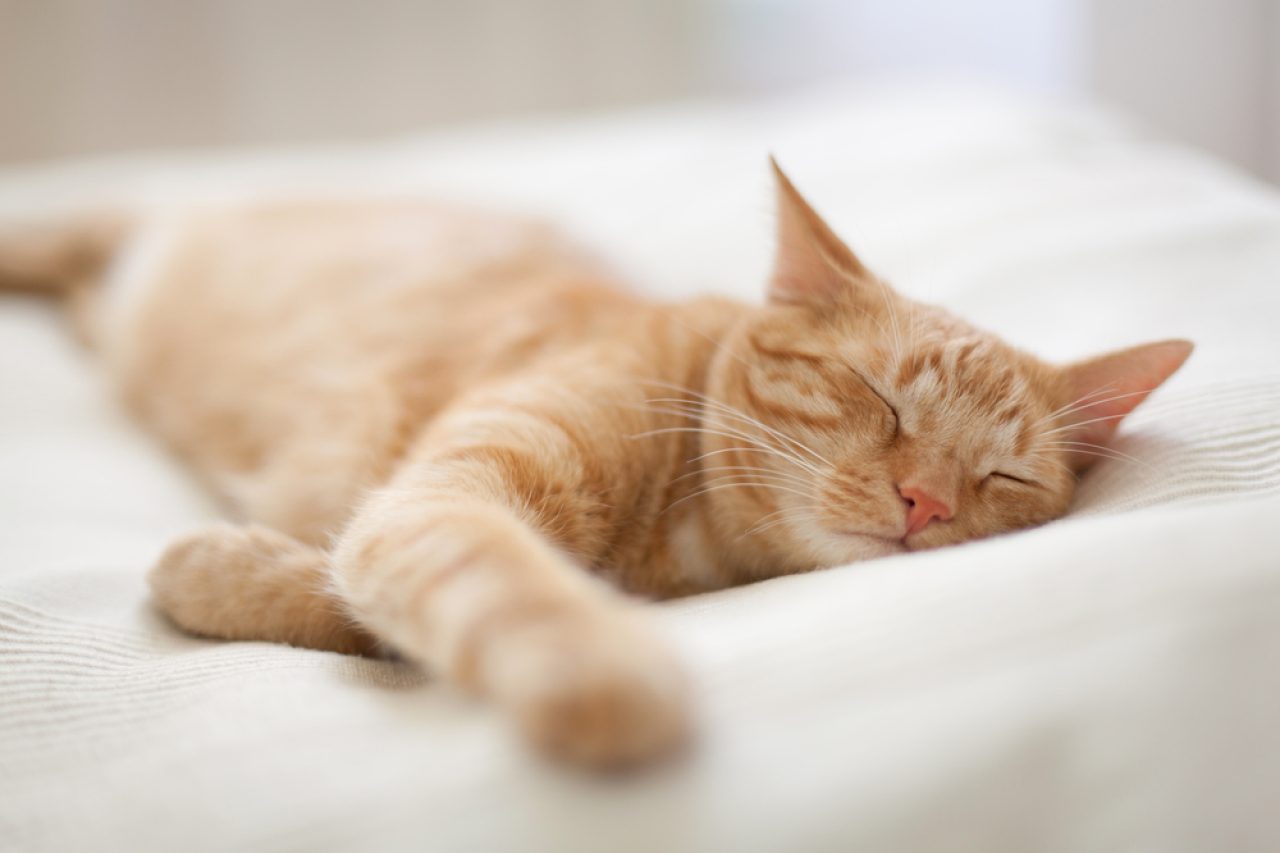
Cats are known to be extremely inclined to stress and anxiety, and they are a common trigger for many conditions cats can go through. Nightmares are one of them, too.
Some of the situations that can induce stress and anxiety in cats are boredom, loneliness, loud noises (like car horns or dog barking), unsanitary living conditions, the shortage of food, and many more.
The stress these kinds of situations cause in cats can remain and be re-lived again in bad dreams. The less stressful situations cats go through – the fewer nightmares they will have.
6. They are dealing with post-traumatic stress disorder
Another reason why cats have nightmares may be hidden in another unfortunate condition, and that is a post-traumatic stress disorder.
Post-traumatic stress disorder (PTSD) in cats is an anxiety disorder that develops due to previous exposure to a traumatic situation, which potentially resulted in great physical pain.
Feline PTSD is different from any other type of stress and anxiety cats go through and that’s because they get diagnosed with it and therefore receive proper medication. This disorder significantly changes their behavior and greatly affects their everyday lives.
This usually happens to cats who have been cruelly treated in the past by previous owners or who have spent a part of their lives in change. With those cats, nightmares seem like their brain’s way of dealing with awful memories.
What can you do if your cat has nightmares?
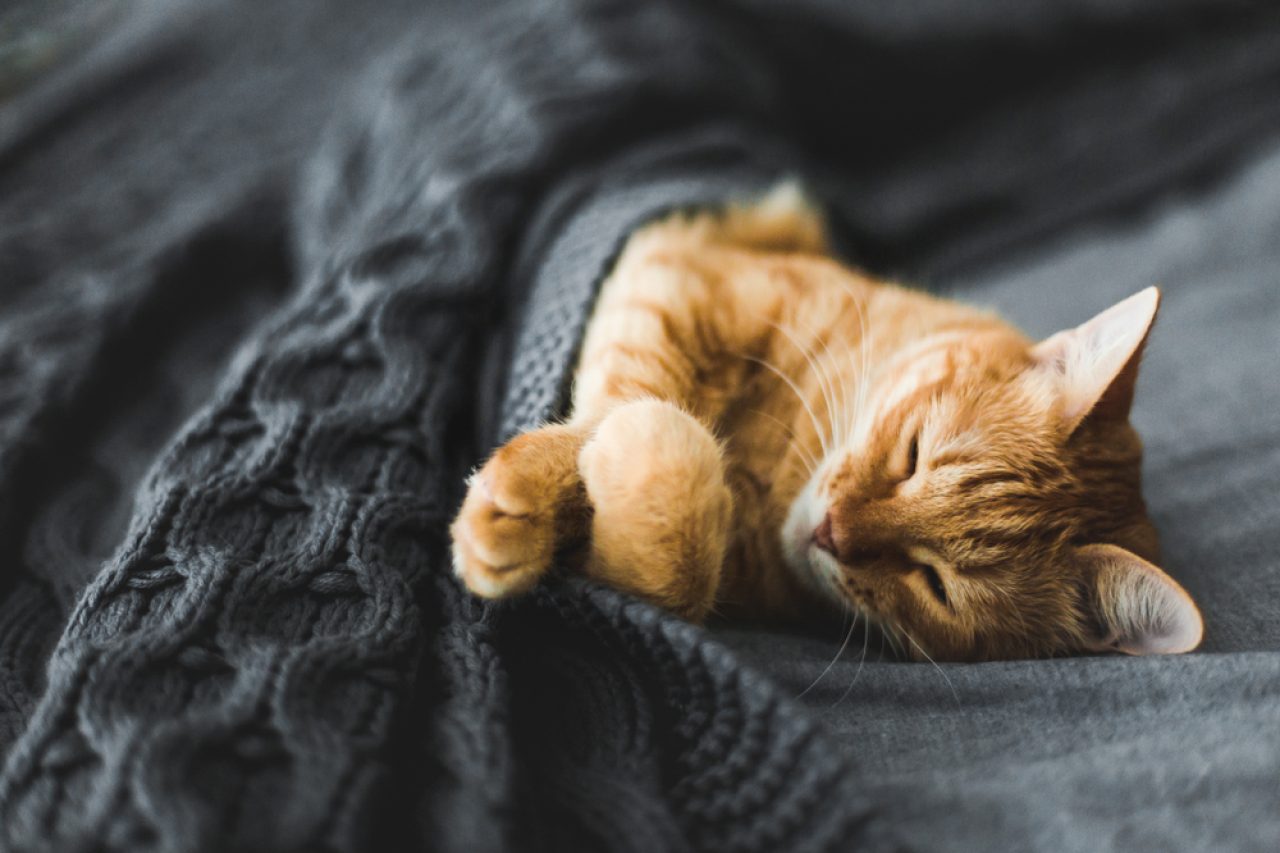
No cat parent in the world wishes to witness his cat having a nightmare. And I’m sure you’re no exception! You’re probably trying to be the best owner ever, ensuring your kitty is living her best furry life, but some things are simply beyond your control.
There’s really nothing much you can do when your cat is in the middle of a nightmare. Don’t even think about waking her up since that would only startle her and potentially become another anxious experience (hence another nightmare trigger).
Frightened and distressed cats, especially those that have just woken up from a bad dream and are still disoriented, can be very aggressive and instinctively ready to attack.
Furthermore, the nightmare probably increased their heart rate, and waking them suddenly can only make the situation worse and more life-threatening. In senior cats, it can even result in cardiac arrest.
So, you definitely want to be gentle with your little dreamy monster. You want to take a good position, neither too close nor too far away from her, so you can protect yourself from a potential attack, but also be helpful when she wakes up confused and scared.
One thing you can do, though, is to gently and softly call her name. Your cat will be able to hear the sound of your voice while dreaming which will act as a reassurance that everything’s okay and that she’s safe.
You can also slowly bring closer some of her favorite toys or blankets, the smell of which she will recognize and which will further convince her of her safety. This way, her brain might recall some of the more pleasant memories, slowly rejecting the nightmares.
When your cat awakes from a bad dream, you should be there to comfort her. However, you should let her decide if and when she’ll come to you. You can give her treats, and slowly find a way to her heart. But, it’s crucial not to force anything on her.
Final words
Overall, to prevent nightmares from happening, make sure your cat is exposed to stressful situations as little as possible. Create a routine that works for both of you, and stick to it. Ensure her environment is clean, she’s always warm, nourished, loved, and played with.
Nightmares can never be completely avoided, but that’s not the point. The point is that your kitty has someone to greet her with lots of love and attention when she finally returns from the land of bad dreams.
